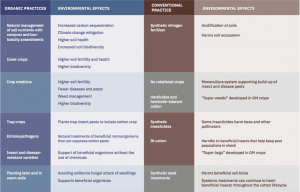Organic means grown without pesticides or herbicides, which are harmful to the planet and the farmers who work with them after repeat exposure. Non-organic cotton is not sustainable because it does the opposite, using frequently toxic chemicals to grow and dye it.
Cotton has the potential to be an extremely sustainable resource. It is a plant fibre so in theory it is infinitely renewable and biodegradable. But it can only achieve its sustainable credentials when it is farmed and produced with conscious awareness to its impact. This is where organic methods come in.
A report on organic cotton was published by The Organic Center, a site that collates scientific findings on food and agriculture. It stated that organic cotton went beyond its definition, and is actually environmentally beneficial, “because it supports a healthy ecosystem and prevents the use of toxic synthetic chemicals”.
Not only does organic cotton avoid the use of “toxic, persistent pesticides, synthetic fertilizer, sewage sludge, or genetically modified organisms (GMOs)” but “organic farmers also have to use methods that build soil health and support on-farm biodiversity”. Organic farms typically have better conservation and diversity of species, which helps to regulate and stabilise the ecosystem, ensuring continuously healthy crop yields.
Crop rotation and soil-building strategies on organic cotton farms leads to carbon being sequestered in soil. This means the soil acts as a carbon sink and an important weapon against climate change. Organically managed soil also retains water and nutrients more effectively than soil in non-organic cotton farming which commonly suffers erosion. A significant reduction in both carbon emissions and water pollution means organically farmed cotton actually benefits the environment, while obtaining a fibre for making quality clothing.
Image: The Organic Center
Iowa State University research project surveying organic cotton producers and processors on the specific approaches and methods used in organic cotton production and processing, and the environmental impacts of those techniques.
Organic cotton is safer for workers, as protecting the health of people in the supply chain is an important priority of organic farming. The Global Organic Textile Standard is “the world’s leading processing standard for organic textiles” and follows the cotton through the supply chain. In order to be GOTS certified, “manufacturers cannot use techniques that pose risks to workers”.
When choosing to produce with cotton, it is important to ensure the material is 100% organic. Some producers mix cotton with poly (plastic based) fibres, which would change and most likely impair these qualities of sustainability.
At Colle Group, our organic cotton is produced in India and other Asian countries and is never blended or mixed with non-organic fibres.



